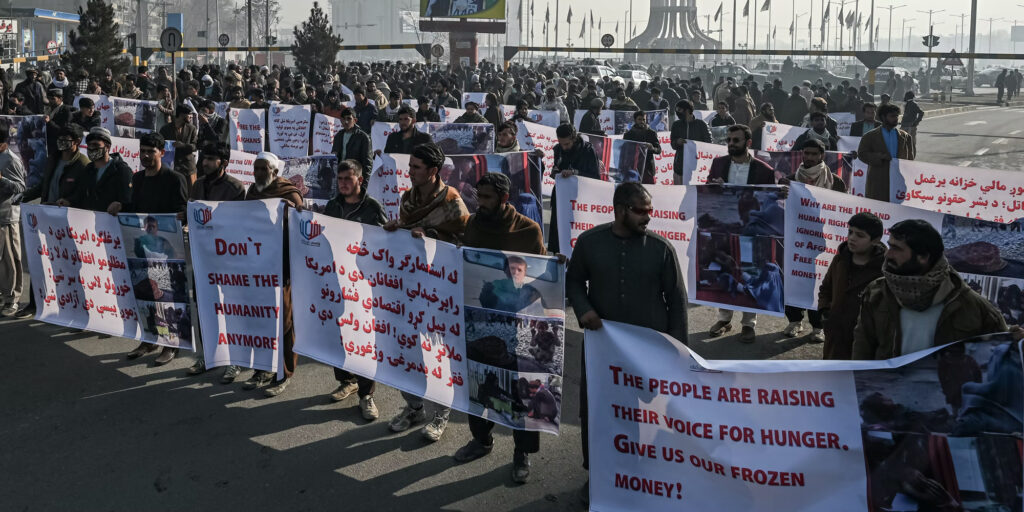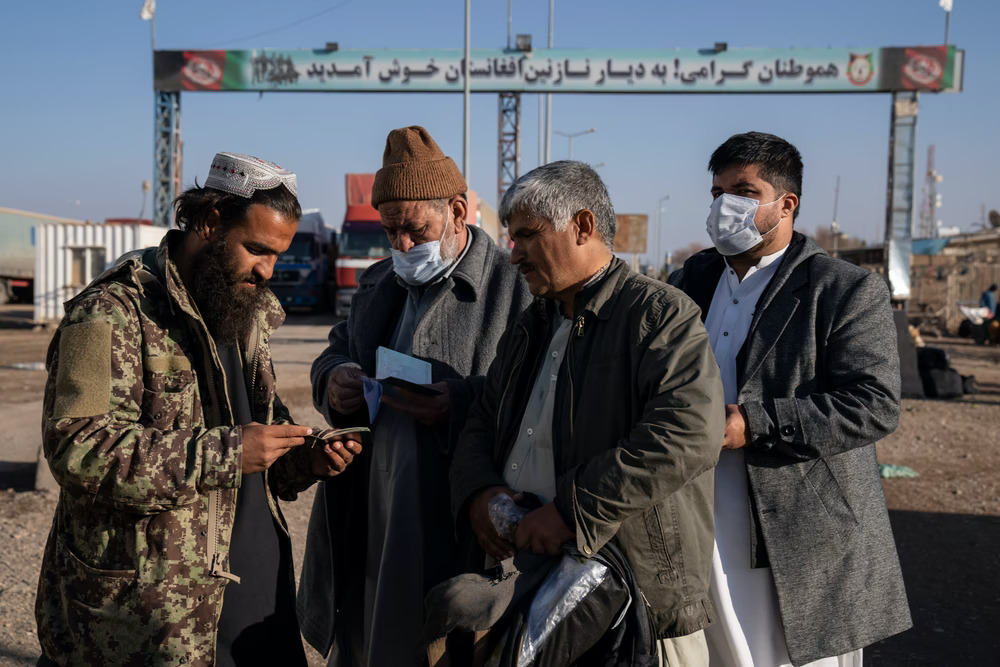Humanitarian Exemptions to Crushing U.S. Sanctions Do Little to Prevent Collapse of Afghanistan’s Economy
CENTRAL ASIA, 3 Jan 2022
Lee Fang | The Intercept - TRANSCEND Media Service
More Afghan people may die from sanctions than from 20 years of war.

Afghans protest the former US embassy building demanding the release of Afghanistan’s frozen assets and resuming international funds amid worsening economic conditions in Kabul, Afghanistan, on Dec. 21, 2021.
Photo: Mohd Rasfan/AFP/Getty Images
28 Dec 2021 – When the U.S. pulled out of Afghanistan in August, ceding to the Taliban, the country’s economy began a severe contraction — what the Financial Times calls “one of the worst economic meltdowns in history.” The sprawling crisis has left nearly 23 million people in extreme hunger, and at least 1 million children under the age of 5 are now facing the immediate threat of starvation, according to the United Nations.
As commerce ground to a halt, food and fuel prices skyrocketed, in large part due to economic sanctions placed on the Taliban by the U.S. As many as 300,000 Afghans have fled to neighboring Pakistan, and many more refugees may soon leave the country. There are even reports that some Afghans have resorted to selling their children in order to feed their families.
The Biden administration defends the sanctions by pointing to a series of exemptions designed to allow humanitarian aid. The Treasury Department has touted its role as a leading humanitarian donor to the people of Afghanistan and its work to ensure that funds flow “through legitimate and transparent channels” via official sanction exemption licenses.
But those humanitarian exemptions, overseen by the Treasury’s Office of Foreign Assets Control, are nowhere near enough, according to experts who spoke to The Intercept. The OFAC licenses, including new licenses released December 22, have not curbed the global chilling effect of the sanctions and are ineffective in preventing a spiraling disaster that could kill more Afghan people than nearly 20 years of U.S.-backed war and occupation.
Businesses and individuals that violate U.S. sanctions on the Taliban risk steep fines and criminal penalties. The broad sanctions imposed by the U.S. lack specificity and raise the possibility that routine commercial activities in Afghanistan could fall under sanctions policy.
“None of these OFAC licenses, none of them, addresses the issue of international banks in their dealing with Afghan banks, hesitancy to deal with Afghan taxes, banking transactions for commercial imports,” said Shah Mehrabi, a member of Afghanistan’s central bank board. “The sanctions have created a lot of fear in the minds of those who do not want to go ahead and engage in taking this particular risk.”
OFAC has issued licenses for medicine, remittances, education salaries, and other forms of humanitarian assistance. Additional licenses released last week allow exemptions for education funds and expand the scope of U.S. funds to aid organizations in Afghanistan. Mehrabi, who teaches economics at Montgomery College in Maryland, noted that much of Afghanistan’s domestic economy faces impending failure, a problem that cannot be solved by “merely allowing humanitarian aid to flow.”
The Treasury Department, added Mehrabi, has focused on piecemeal humanitarian exemptions and has not addressed the central issue of how Afghanistan can import and export goods, collect taxes, and pay salaries. “We’re talking about an economy that’s going to collapse if Treasury does not clarify what could be done to the liquidity issue,” said Mehrabi.
When the Taliban seized control of Afghanistan in August, U.S. sanctions imposed since 2002 that criminalize any form of support for the Taliban as a Specially Designated Global Terrorist group suddenly meant that penalties could apply to leaders of a sovereign state. As U.S. forces withdrew, American law firms quickly alerted international institutions across the globe that any business transaction in Afghanistan could risk violating sanctions. Any routine tax payment or duty paid to an Afghan bureaucrat could be construed as aiding and abetting the Taliban.
“Even if the Secretary of the Treasury does not specifically designate the entire Government of Afghanistan, it will be very difficult for contractors and grantees to know whether standard transactions with the Government of Afghanistan, such as paying taxes, permit fees, utility fees, import duties, or other routine payments will result in funds passing to the Taliban or its leaders in control of various branches of the Afghan government,” noted a client alert from the law firm Nichols Liu.
Contractors and businesses, the firm noted, can expect banks to “de-risk from Afghanistan,” meaning that fund transfers to or from Afghanistan “will be intercepted by intermediary banks and blocked until the contractor or grantee can demonstrate that the specific transfer to and the use of funds in Afghanistan will comply with U.S. sanctions.”
“The banking industry is reading [the sanctions] as, ‘The entire government is now the Taliban.’”
“The banking industry is reading [the sanctions] as, ‘The entire government is now the Taliban,’” a former U.S. Treasury Department official told the Crisis Group.
The far-reaching sanctions, along with a Biden administration decision to freeze nearly $10 billion of Afghanistan’s central bank national reserves, sent the economy into free fall. Payments to doctors and police stopped. Hospitals ran out of medicine. Residents could not withdraw bank deposits. Even a printing press in Poland contracted to print afghanis, the local currency, could not deliver its shipment.
Rajeev Agarwal, the chief financial officer of KEC International, an Indian firm tapped to build electric utility transmission lines in Afghanistan, told investors in October that its five projects in the country suddenly ceased payments in August. The “U.S. has choked all the funding lines to Afghanistan,” reported Agarwal, according to a transcript of the call.
“Sanctions are intended to have a chilling effect, in that sanctions will always go beyond the face of the text,” said Adam Weinstein, a research fellow with the Quincy Institute for Responsible Statecraft. “No bank or business wants to walk right up to the line when it comes to compliance with U.S. sanctions policy, given that these are risk-averse institutions.”
Last week, 40 members of the House of Representatives wrote to President Joe Biden urging him to ease sanctions and release Afghanistan central bank funds controlled by the U.S. government. “No increase in food and medical aid can compensate for the macroeconomic harm of soaring prices of basic commodities, a banking collapse, a balance-of-payments crisis, a freeze on civil servants’ salaries, and other severe consequences that are rippling throughout Afghan society, harming the most vulnerable,” noted the letter, led by Reps. Pramila Jayapal, D-Wash.; Sara Jacobs, D-Calif.; and Jesús G. “Chuy” García, D-Ill.
The letter also called on the administration to provide clarity to financial institutions, including what’s known as “comfort letters” from the Treasury Department to reassure banks that they may engage in commerce without risk of violating sanctions.
The Intercept asked the Treasury Department for comment about the concerns raised by the congressional letter, including whether the agency has provided comfort letters to reassure banks that they would not violate U.S. sanctions while facilitating transactions in Afghanistan. Morgan Finkelstein, a spokesperson for the Treasury Department, did not respond directly to the question about the comfort letters and pointed to the existence of the OFAC exemption licenses to respond to questions about concerns that U.S. sanctions are damaging the Afghanistan economy.
“In contrast to sanctions programs administered and enforced by OFAC with regard to North Korea, Cuba, Iran, Syria, and the Crimea region of Ukraine, there are no comprehensive sanctions on Afghanistan,” reads an FAQ on the Treasury site that Finkelstein sent. “Therefore, there are no OFAC-administered sanctions that prohibit the export or reexport of goods or services to Afghanistan, moving or sending money into and out of Afghanistan, or activities in Afghanistan, provided that such transactions or activities do not involve sanctioned individuals, entities, or property in which sanctioned individuals and entities have an interest.”
Kevin Schumacher, deputy executive director of the nonprofit Women for Afghan Women, noted that banks and other multinational firms are reluctant to pay large legal fees to review hundreds of pages of Treasury Department guidelines with each client just to engage in commerce with Afghanistan. The problem, he said, is that the U.S. government “doesn’t really understand who they are going after.”
“The OFAC licenses never work, never will.”
“That fear of the unknown,” said Shumacher, “is what prompts this massive blanket sanction regime that has resulted in the tragedy that we are seeing.”
“The OFAC licenses never work, never will,” added Shumacher. “The moment that the banks see any sanction or any sort of restriction, they just walk away from doing any transactions. That’s what’s happening now with Afghanistan. The banks are not willing to take our business, and no amount of OFAC licenses is going to satisfy their needs.”
In the past, multinational corporations and banks have over-complied with U.S. sanctions, ignoring OFAC licenses. Schumacher pointed out the history with Iran: The U.S., while imposing stringent sanctions on Iran, released OFAC licenses for the delivery of medicine and other medical products. But banks, in fear of violating the U.S. sanctions, ignored OFAC licenses and routinely blocked the trade of medicine and other health care products to Iran.
The Washington Post reported in 2012 that despite OFAC licenses allowing the exports of medicine to Iran, exports of medicine quickly dwindled. “The exemption of medicine from sanctions is only in theory,” one Iranian importer told the Post. “International banks do not accept Iran’s money for fear of facing U.S. punishment.”
There is little appetite among politicians in Washington, D.C., to radically reverse course. The Biden administration, facing low public approval ratings following the exit from Afghanistan and a tough forecast for the 2022 midterm elections, may be continuing sanctions for political reasons. Releasing the sanctions could be viewed as recognition of the Taliban as the legitimate rulers of Afghanistan, a symbolism that could cement negative attitudes about the administration and its Afghanistan policy. Senate Republicans, led by Sen. Mitt Romney, R-Utah, and Sen. Jim Risch, R-Idaho, have released demands that the administration go even further in sanctioning the Taliban, including any foreign governments that provide support to Afghanistan.
Earlier this month, the Intercept attempted to speak to a number of senators, Democrats and Republicans, about U.S. sanctions fueling widespread famine in Afghanistan. Many refused to talk about the issue.
“I think we need to get aid to the Afghan people, but also I think it’s the responsibility of the Taliban government to comply with what needs to be done,” said Sen. Tammy Duckworth, D-Ill., without elaborating. Sen. Josh Hawley, R-Mo., said any questions about Afghanistan should be posed to Democrats and the Biden administration, not Republicans.
“We’ve deluded ourselves into thinking that sanctions are precise. They’re not.”
The Intercept also reached out to the offices of Sen. Rand Paul, R-Ky., and Sen. Bernie Sanders, I-Vt., two vocal opponents of sanctions overreach in the past, to comment on Biden administration sanctions on Afghanistan. Neither responded.
Sanctions are often held up as a politically and morally viable alternative to war. Not many Democrats want to revisit the issue of Afghanistan, and few politicians on either side of the aisle would recommend direct military engagement with the Taliban. But the ongoing famine crisis and the destruction of what remains of the Afghan economy could result in the deaths of millions of people.
The glib attitude among many in Washington toward the destruction wrought by sanctions was captured in a memorable exchange with the Clinton administration about its heavy-handed policies against Iraq.
In 1996, CBS “60 Minutes” anchor Lesley Stahl asked then-Secretary of State Madeleine Albright about the half-million children in Iraq who died from malnutrition because of U.S. sanctions against Saddam Hussein’s government. “Is the price worth it?” asked Stahl. “I think this is a very hard choice,” replied Albright. “But the price — we think the price is worth it.”
“We’ve deluded ourselves into thinking that sanctions are precise,” said the Quincy Institute’s Weinstein. “They’re not. They’re not a precision weapon. They’re a blunt force, economic weapon that essentially kills civilians.”
________________________________________________
Tags: Afghanistan, CIA, Central Asia, Drones, Geopolitics, Hegemony, Human Rights, Imperialism, International Relations, NATO, Occupation, Pentagon, State Terrorism, Taliban, UK, US Military, USA, Violence, War on Terror, Warfare
DISCLAIMER: The statements, views and opinions expressed in pieces republished here are solely those of the authors and do not necessarily represent those of TMS. In accordance with title 17 U.S.C. section 107, this material is distributed without profit to those who have expressed a prior interest in receiving the included information for research and educational purposes. TMS has no affiliation whatsoever with the originator of this article nor is TMS endorsed or sponsored by the originator. “GO TO ORIGINAL” links are provided as a convenience to our readers and allow for verification of authenticity. However, as originating pages are often updated by their originating host sites, the versions posted may not match the versions our readers view when clicking the “GO TO ORIGINAL” links. This site contains copyrighted material the use of which has not always been specifically authorized by the copyright owner. We are making such material available in our efforts to advance understanding of environmental, political, human rights, economic, democracy, scientific, and social justice issues, etc. We believe this constitutes a ‘fair use’ of any such copyrighted material as provided for in section 107 of the US Copyright Law. In accordance with Title 17 U.S.C. Section 107, the material on this site is distributed without profit to those who have expressed a prior interest in receiving the included information for research and educational purposes. For more information go to: http://www.law.cornell.edu/uscode/17/107.shtml. If you wish to use copyrighted material from this site for purposes of your own that go beyond ‘fair use’, you must obtain permission from the copyright owner.


